June 3, 2025 | 00:25 GMT +7
June 3, 2025 | 00:25 GMT +7
Hotline: 0913.378.918
June 3, 2025 | 00:25 GMT +7
Hotline: 0913.378.918
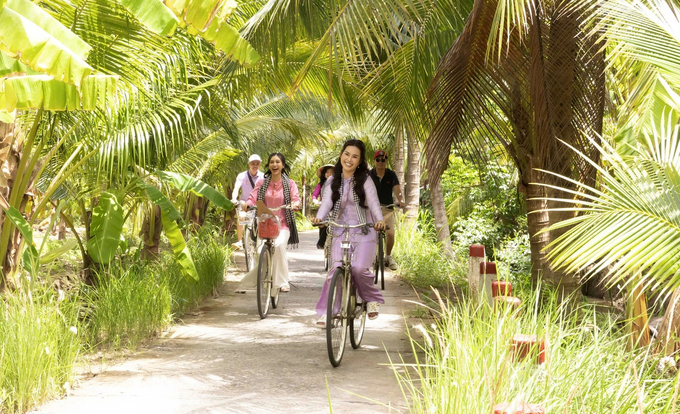
Tourists cycle under the cool green coconut gardens.
Ben Tre is the first province in the Mekong Delta to cooperate with the Institute for Applied Research and Business Innovation (3AI) to pilot the Net Zero tour. Coming to this tour, each tourist can do many good deeds for a sustainable green environment, contributing to the fight against climate change.
Before departure, tourists will be given a green passport and a pencil by C2T Media and Tourism Company Limited to record their activities during the tour. Each action that is good for the ecological environment and reduces emissions will be counted as offset points for emissions during the trip.
When receiving the passport, tourists are instructed by the tour guide to take notes such as tourists coming from Ho Chi Minh City, traveling by 4-seat car, emissions from one car: 22kg CO2. A group of 16 people traveling by four cars, total emissions: 88kg CO2.
To neutralize emissions from means of transport, the tour guide suggests actions that tourists can participate in to offset emissions. Everyone is eager for the environmental actions they will contribute to.
The tour departs from the tourist pier on the north bank of the Ben Tre River, and the boat moves slowly on the Ben Tre River following the route of this company's previous "City under the Coconut Tree" tour.
The boat runs to the south bank of the Ben Tre River and stops close to the mangrove forest. On the ship, passengers can reach out and pick sour mangrove fruits if, in the past, they could pick the mangrove fruits freely, put them on the boat, dip them in salt and chili, and bring them home as souvenirs. Still, the tour guide advises visitors to pick only one fruit and leave many fruits on the tree when the fruit is ripe; there are some for the birds to eat, the ripe fruit falls into the water, the catfish, the pineapple fish eat...
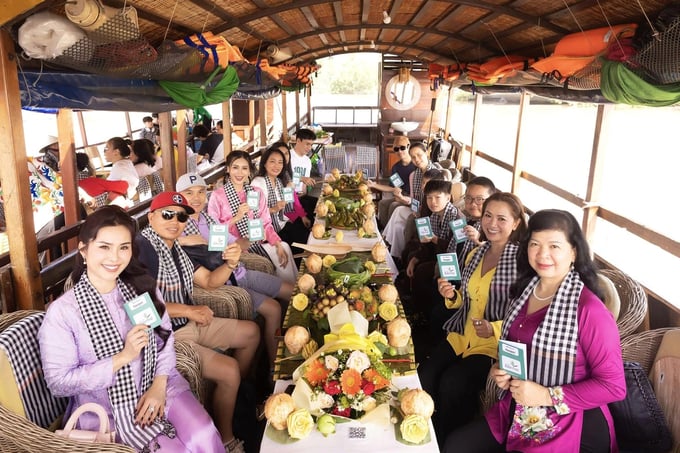
Tourists are granted "green passports".
On the boat, tourists can see people making a living on the river; they fish and drag nets for shrimp and fish in the river. In the nets, there are big shrimps with two long green claws, big and small shrimps and fish, shrimps with eggs, palms, tree roots, plastic waste...
The tour guide suggests that tourists spend money to buy fish, small shrimps, and shrimp eggs and release them back into the river, giving a little money for the net pullers to keep palms, tree roots, and plastic waste to bring back and destroy instead of releasing them back into the river environment.
No one said anything. Almost all tourists agreed with the tour guide's words. Everyone's face showed joy and happiness when doing valuable work. The tour guide said that releasing small shrimp, fish, and shrimp eggs into the river protects aquatic resources from being exhausted, keeps the trash from being brought back and destroyed, and contributes to cleaning the riverbed. This action is counted as a deduction for previous emissions.
On the boat, tourists are quenched with cold coconut water and pineapple coconut. The tour guide said that using coconuts instead of bottled water does not release plastic waste into the environment. The straws are made from grass. After the customers throw away the drinking coconuts, the company's staff collects them and brings them to the garden to use the young coconut meat to feed the chickens. The coconut shell decomposes into organic fertilizer for the plants.
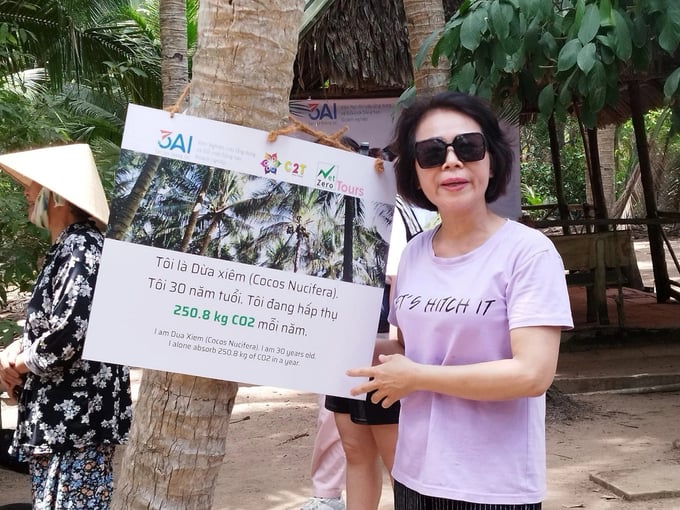
Tourists take souvenir photos with coconut.
During the tour, tourists are invited by the tour guide to participate in planting trees on the riverbank. Many tourists exclaimed with delight when setting foot on the soft, smooth mud flats, planting young mangrove trees (also known as willow trees). In a short time, the mangrove roots will grow densely on the flats, holding alluvial sediment, preventing landslides, and becoming a place to develop a diverse ecosystem. Under the mangrove canopy are roof beam trees, trumpet trees, and water coconut trees...
The journey of the tour continues to take the group to the cool, shaded roads and canals of water coconut trees, then to the green coconut gardens laden with fruit in Nhon Thanh commune, Ben Tre city, which is home to many establishments welcoming eco-tourists in this locality.
Here, tourists buy tickets to watch traditional music, watch mat weaving, buy handicrafts from coconuts, and buy locally produced coconut candy. Visitors can enjoy cycling on country roads and rowing boats on rivers and canals, which are activities that do not emit any environmental emissions.
The final destination of the tour is the 2-hectare coconut and pineapple garden of Ms. Sau Diep. Many visitors are surprised to see the signboard: “I am a coconut (cocos Nucifera). I am 30 years old. I absorb 250.8 kg of CO2 per year”.
At Sau Diep’s coconut garden, visitors can sign a contract to pay in advance for a coconut tree for a certain number of years, fertilizing it with organic fertilizer. Visitors from far away can sell the fruit to C2T Tourism and Trading Company during the contract period to reduce investment costs or receive the coconut fruit to take home.
Buying a coconut tree will help the gardener feel secure about the price of the coconut fruit, and owning a coconut tree will contribute to capturing carbon dioxide in the environment. Buying a coconut tree will earn visitors points to offset emissions during the trip. C2T Tourism and Information Technology Company has also digitized information about coconut trees to help tourists easily look up and track via smartphones.
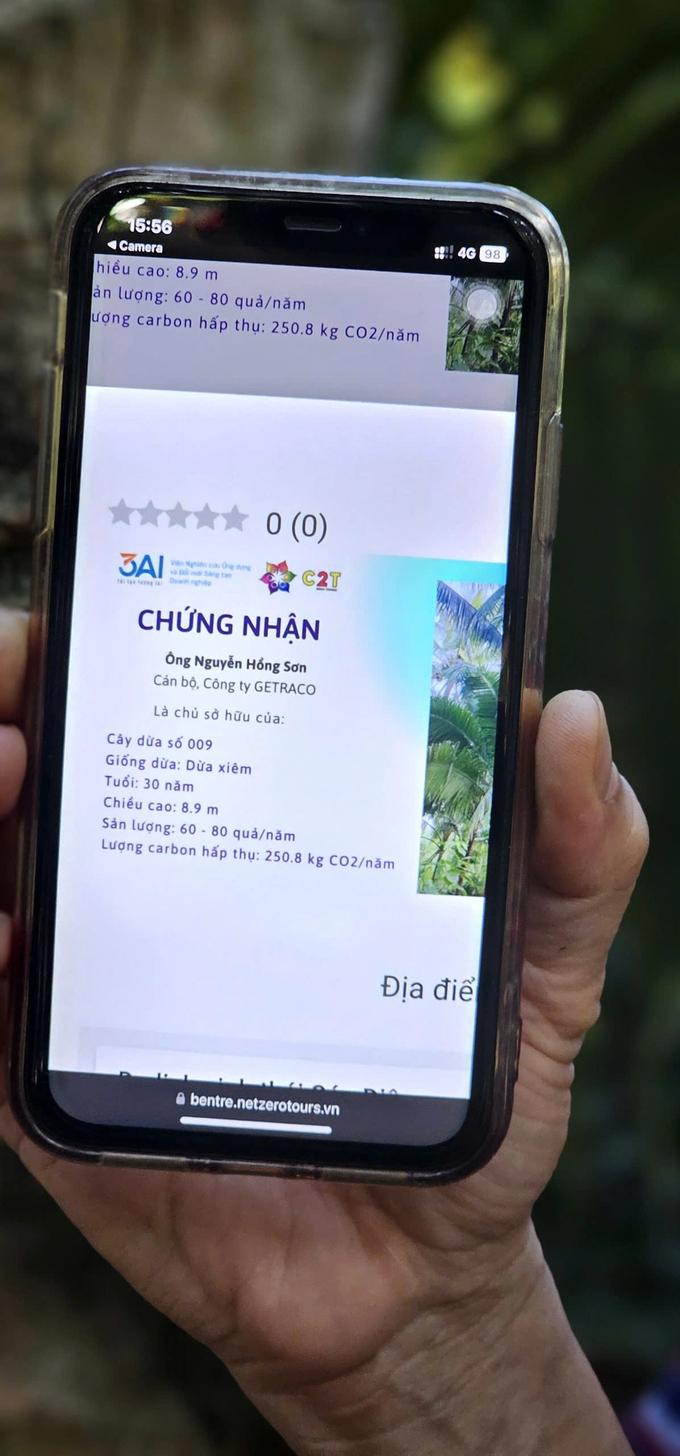
Certificate issued to visitors.
Tourists who take many actions to reduce emissions during the trip will be counted as neutral emissions via their smartphones. If they have not achieved this, they must take further actions to achieve carbon neutrality, such as buying organic fertilizer at tourist destinations to fertilize vegetables and ornamental flowers.
The trip at night, the tide is low, the boat drifts with the water, no diesel engine, the lights are on inside the boat, solar energy lights - renewable energy, truly a green renewable Netzero tour.
Netzero tour is a new C2T Ben Tre Tourism and Travel Company model responding to the Government's policy "Vietnam has decided to commit to achieving zero net emissions by 2050".
Tran Anh Tuan - Deputy Director of the 3AI Institute for Research, Application, and Business Innovation, said that the pilot implementation of the "Netzero tours Ben Tre" model aims to promote green tourism, reduce carbon, and strive for the Netzero goal in Ben Tre. At the same time, it helps raise awareness of environmental protection through the model and emphasizes the importance of environmental protection and sustainable tourism development. The model has the potential to be replicated within and outside the province.
Translated by Huong Giang
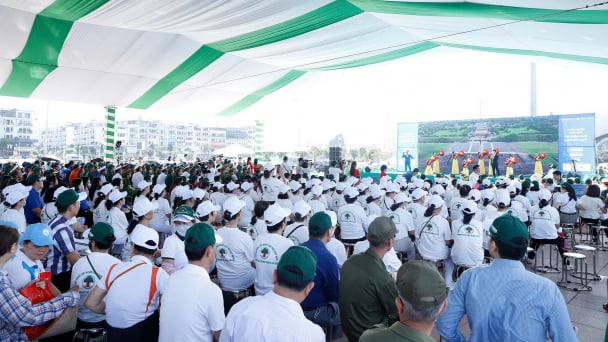
(VAN) On June 1, a grand meeting was held in Ha Long city, Quang Ninh province, to celebrate World Environment Day and launch the National Action Month for the Environment 2025.

(VAN) From the meeting in Ha Long, the United Nations called for the establishment of a legally binding global treaty to end plastic pollution.
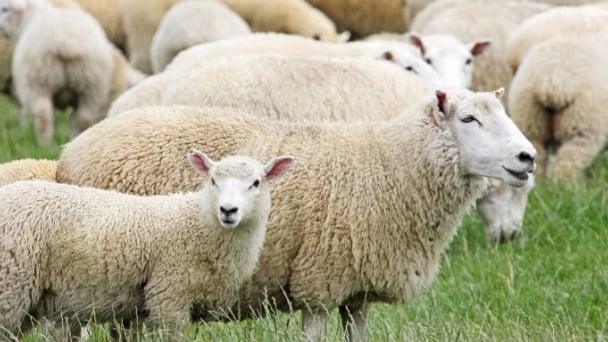
(VAN) ‘Accounting trick’ to support methane-emitting sectors undermines fight against climate change, say researchers.
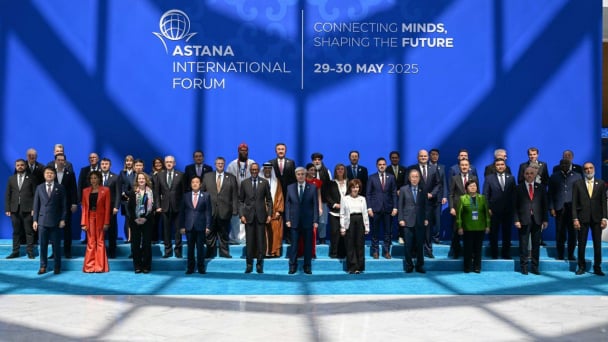
(VAN) Water conservation, transboundary cooperation and sustainable agriculture are key to securing the region’s future, says FAO Director-General QU Dongyu.
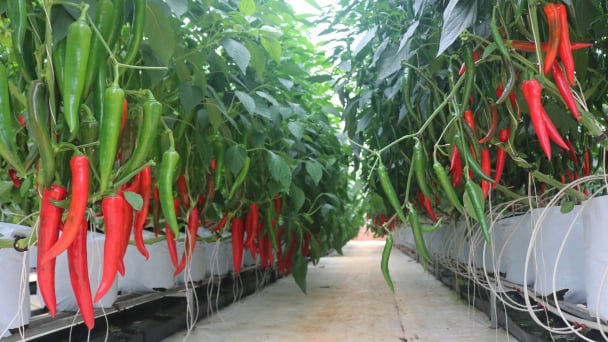
(VAN) Professor Dr. Mai Trong Nhuan believes that Lam Dong will serve as a 'supermarket' of green agricultural products for the entire country and a beautiful destination acting as a 'health charging station' for tourists.
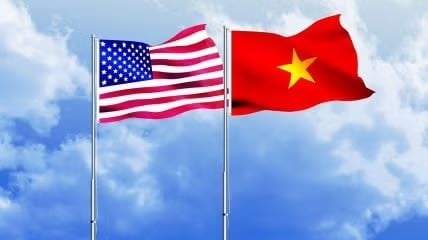
(VAN) A delegation of nearly 50 Vietnamese agencies, agribusinesses, and agricultural associations has officially begun its working trip to the United States.
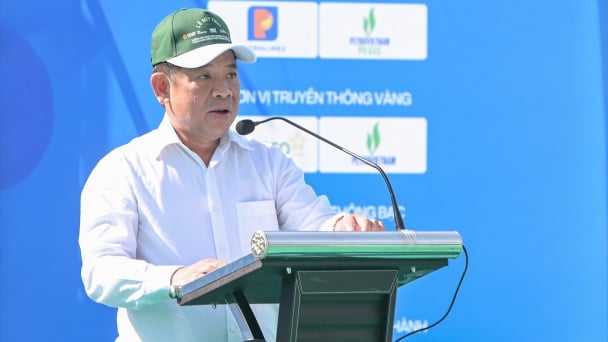
(VAN) Mr. Van Ngoc Thinh, CEO of WWF-Vietnam, warned that plastic waste is the starting point of a chain of ecological degradation and the decline of coastal livelihoods.